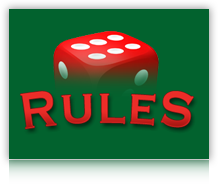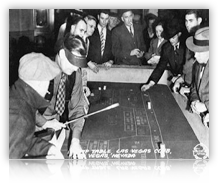This strategy is somewhat risky, but it does work. The main problem with this strategy is that when it fails, you pay for it in a big way. However, it often does not fail, and therefore it has the potential to pay off a lot of money over time.
Start by following the strategies we describe for betting on the 7. That strategy in and of itself is a sound one, and while it may not work every time, it does work often and can be used to make money over a long period of time very successfully. Pay attention to the dice and the numbers that are rolling. If you notice that 7 has not rolled in some time, statistically it will roll very soon, so you should be patient and wait before employing the strategy I am about to describe.
If you notice the 7 has rolled several times in a short period of time, for example, you see three or four 7’s roll on the come out roll before a point is established, then you may want to give this risky maneuver a try. Once the point has been established, place a large bet on every place bet that is not the point. For example, if 6 is the point, and you are only betting $1 at a time on the pass and no pass lines, place a $10 place bet on 4, 5, 7, 8, 9, and 10. Then place a $2 to $5 bet on the field bet.
You know have every possible roll covered with the exception of the point and 7. You may leave the bets out for as long as you can stomach it, but letting all that money ride for more than a roll or two only serves to increase the danger of losing it. I suggest as soon as you hit once, maybe twice, clear your bets and stick to the “bet on 7” strategy.
Of course, the downside to this craps strategy is a big one. As you should know by now, 7 is the most probable number to roll with every roll of the dice. And if a 7 rolls right after the point has been established, you will lose quite a bit of money.
However, if you have noticed 7 roll several times in a row on the come out roll, the laws of statistical probabilities are in your favor if the point is established in the next roll. Statistically, 7 SHOULD roll once every 6 rolls, so if it has rolled three or four times in a row, statistically speaking, it shouldn’t roll for another eighteen or more rolls. Of course statistical odds are not guarantees, only guidelines, but they are all a gambler has to rely on besides his gut feeling when placing bets.



